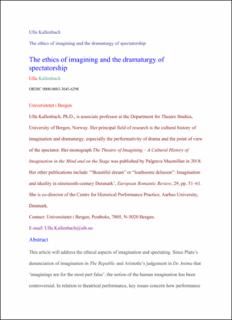| dc.contributor.author | Kallenbach, Ulla | |
| dc.date.accessioned | 2021-07-16T12:03:51Z | |
| dc.date.available | 2021-07-16T12:03:51Z | |
| dc.date.created | 2021-02-25T11:40:05Z | |
| dc.date.issued | 2020 | |
| dc.identifier.issn | 1757-1979 | |
| dc.identifier.uri | https://hdl.handle.net/11250/2764686 | |
| dc.description.abstract | This article will address the ethical aspects of imagination and spectating. Since Plato’s denunciation of imagination in The Republic and Aristotle’s judgement in De Anima that ‘imaginings are for the most part false’, the notion of the human imagination has been controversial. In relation to theatrical performance, key issues concern how performance acts on the imagination of the spectator ‐ and what actions of the spectator’s imagination might perform in return. In this article, I will address the ethics of imagination: as an examination of truth and falseness, as an issue of responsibility and choice, as a social imaginary and a narrative imagination that allows one to relate to the other, and finally as an exploration of the embodied basis of imagination, which again involves a questioning of the line between the real and the imaginary. In conclusion, I will take Sarah Kane’s Cleansed and Tim Crouch’s The Author as examples of two plays that explicitly address the ethics of imagining. | en_US |
| dc.language.iso | eng | en_US |
| dc.publisher | Intellect | en_US |
| dc.title | The ethics of imagining and the dramaturgy of spectatorship | en_US |
| dc.type | Journal article | en_US |
| dc.type | Peer reviewed | en_US |
| dc.description.version | acceptedVersion | en_US |
| cristin.ispublished | true | |
| cristin.fulltext | postprint | |
| cristin.qualitycode | 1 | |
| dc.identifier.doi | https://doi.org/10.1386/peet_00016_1 | |
| dc.identifier.cristin | 1893623 | |
| dc.source.journal | Performing Ethos: International Journal of Ethics in Theatre & Performance | en_US |
| dc.source.pagenumber | 41-55 | en_US |
| dc.identifier.citation | Performing Ethos: International Journal of Ethics in Theatre & Performance. 2020, 10 (1), 41-55. | en_US |
| dc.source.volume | 10 | en_US |
| dc.source.issue | 1 | en_US |
